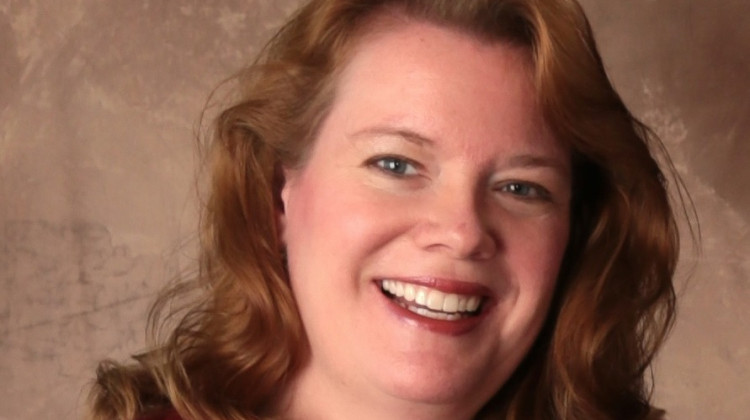
Loretta Rush speaks after being introduced as the new Supreme Court judge at the Statehouse Friday, Sept. 14, 2012.
AP Photo/Darron CummingsUpdated
INDIANAPOLIS – Indiana made history Wednesday afternoon when a nominating panel selected Loretta Rush to be the next chief justice of the Indiana Supreme Court.
She is the first woman in the nearly 200 years of the court to hold the position.
“I’m thrilled to serve the state of Indiana in this capacity,” said Rush. “We have a strong court, and wonderful colleagues, and I appreciate the work the Judicial Nominating Committee did. I look forward to serving the state for as long as I can.”
Rush will take over from outgoing Chief Justice Brent Dickson, who plans to step down later this month. He will remain a justice on the five-member court.
The nominating commission was charged with choosing a new chief justice from among the court’s current members. The commission interviewed each justice and Rush stood out by the depth with which she outlined her ideas for the position.
She said the next chief justice should be “visionary” and have strong managerial skills.
Gov. Mike Pence said in a statement Wednesday that Rush will provide the court with “outstanding leadership.”
“With her extensive legal experience, proven character and commitment to public service, I am confident that Chief Justice Rush will serve our judiciary and our state with distinction,” he said.
Rush was appointed to the state’s highest court nearly two years ago by then-Gov. Mitch Daniels, a Republican, and is the newest member of the court. She previously served 14 years as an elected Superior Court judge in Tippecanoe County.
She serves on the Commission on Improving the Status of Children in Indiana with Attorney General Greg Zoeller. On Wednesday, he called her “a strong administrator of complex systems and a leader who demonstrates a passion for justice for society’s most vulnerable.”
“I’m confident her service as chief justice will build upon the legal tradition of fairness and excellence of former chief justices Randall Shepard and Brent Dickson that have made the Indiana Supreme Court highly respected throughout the nation,” he said.
Dickson – who was first appointed to the court in 1986 – became chief justice two years ago. The nominating commission chose him in part to provide stability to a court undergoing major change. He replaced Shepard, who had served as chief justice for 25 years. And at the time, Daniels was preparing to appoint the third new justice to the court in five years.
On Wednesday, state leaders say they are confident that Rush will continue the strong leadership of the state’s courts. House Speaker Brian Bosma, R-Indianapolis, said Rush’s “experiences and background have served Hoosiers well.”
“Her legal expertise is second to none, and through her steadfast integrity, Indiana’s legal system will remain strong,” Bosma said. “In her new role, I am confident that Justice Rush will continue to lead with the same level of dispassionate dedication to justice that established her reputation as a champion for Hoosiers families.”
Rush was the first of the three justices to be interviewed. And she fielded a question from former legislator John Ulmer, who is serving on the nominating commission, about her kids and balancing work and home life. That prompted criticism from people watching the issue on Twitter and on blogs.
However, Rush seemed unfazed by the question.
“I’m a mom, I have four children and It’s something I think about in regard to a balance,” said Rush. “So I think a balanced person on the court is important. So I bring that perspective to the court.”
Ulmer didn’t ask a question about work/life balance of any of the other justices. He said later that he asked the question because she mentioned her young son. But he also said that he thought Rush was a great fit and proposed the motion to give her the post.
Rush also addressed being the first women to serve in the position.
“I look forward to the day that it is unremarkable that a women on this court or a women chief justice,” she said. “But I am thrilled to be a woman chief justice on the Supreme Court.”
The commission is made of seven people: the current chief justice, three lawyers, and three non-lawyers. The three lawyers and non-lawyers each must come from the three areas that the Court of Appeals covers.
Allie Nash is reporter at TheStatehouseFile.com, a news website powered by Franklin College journalism students.
 DONATE
DONATE








 Support WFYI. We can't do it without you.
Support WFYI. We can't do it without you.